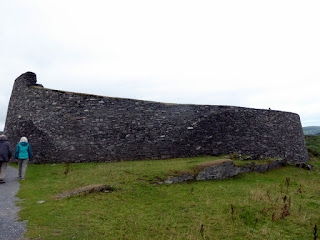Today we set off on a drive around the Kerry peninsula called the 'Ring of Kerry' though it is more of an oblong route than a circle. We saw a lot of the country side and mountains (really tall hills, more like the 'mountains' near us that top out at 3,000 feet), the Atlantic Ocean, an ancient stone abode and the ruins of other places.
Today was also the end of a 3-day fair in nearby Killorglin, where a wild goat is captured and enshrined as King Puck, with 3 days of revelry and entertainment. We drove past a statue to the king, but did not stop as the festivities started later in the day. (BTW, 'cill' ('kill') is Irish for church.)
 |
| Statue of King Puck as we entered Killorgan |
We drove past peat bogs and saw a Kerry Bog pony (going too fast to get a good photo). The pony breed nearly died out and was brought back by one man, and now there are over 300 such ponies. They are about the size of a donkey, with a very stocky body and short legs. Peat is still used here, though not as much as in the past when it was a primary fuel.
 |
| You can see the local mountains rising up in the distance. |
 |
| Peat 'logs' |
Our next stop was an overlook to the Atlantic. The weather was reminiscent of San Francisco with fog, but with more mist.
 |
| Above and below: Atlantic Coast |
 |
| Above and below: Irish countryside and mountains |
Below is a monument to St. Brendan, the Navigator, who is reputed to have sailed a boat like this from Ireland to North America sometime before his death in 577 CE. Many have questioned the story, but a modern adventurer made the same trip in a similar boat, proving that it was possible, if not actual.
Another famous character here was Daniel O'Connell, who was influential in ending the Penal Laws, imposed on Irish Catholics in the 1600's to harsh effect, essentially disinheriting them in their own country.O'Connell argued for Catholic Emancipation which was largely achieved in 1829, although religious persecution of other groups continued until nearly 1900.
 |
| The ruins of the house where Daniel O'Connell was born. |
On the way to a ring stone fort, we passed a former Army depot. The design is unusual because it was supposed to be used in India, but somehow got switched and ended up here instead. Ring Forts were developed in the Bronze Age and in use til about 1000 CE. There are over 40,000 of them identified in Ireland. They were not primarily military, and instead apparently used to add to the safety of a home or small group of homes. The family and their livestock would spend the night in the fort.
 |
| Indian Army design mistakenly sent to Ireland. |
Just beyond this were the two Skellig Islands. The one on the right is a gannet reserve. The larger one on the left was a monastery from the 6th to the 13th centuries. Excavations have suggested the average life span of monk there was only 26 years! The island became especially famous with a recent Star Wars movie, The Force Awakens, as the home of Luke Skywalker.
Another overlook above the bay reminded me of the California coast.


We stopped for lunch at the Sneem Hotel and then walked
downhill into the village. The bus was parked next to a statue of a
local boxer, which looked like a central area had some significance,
because it was much shinier than the rest. I am not sure you can see it
from the photo, so use your imagination.
Our next stop is called "Ladies'View". When Queen Victoria contemplated a visit to this area. several of her ladies in waiting were dispatched to the Killarney area for a YEAR to prepare for her visit. When they weren't busy preparing, this view of the lakes adjacent to Black Valley was a favorite side trip. There are 3 interlinked lakes here, the most famous being Innisfallen, the furthest from the viewpoint. It was know as the Lake of Learning because of a long-term monastery there that functioned as a source of higher education.
 |
| Lovely scenery on the way to Ladies' View |
 |
| Upper Lake |
 |
| Lower Lake and possibly Innisfallen |
On our way back to Killarney, the rain started up (worse than we thought), but we opted to stop for a short hike to a waterfall regardless, and got quite wet -- we had raincoats, but needed rainpants too. The dampness was worth it, however.
 |
Jim is walking ahead while I go for the photo ops. This place
reminded us a lot of Cascade Falls in Mill Valley, with a much
shorter hike in. |
 |
| The river rapids and vegetation downstream from the waterfall. |
 |
I have no idea what kind of tree this is, but
loved the look. |
 |
| Jim's view and photo from a higher point. |
 |
| I got up close (and have a longer zoom...) |
Once we reached Killarney, the rain stopped, we dried off, and took a walk into town with Holly (our guide) to pick a seafood restaurant. The first two she recommended were closed on Sunday, but the third accomodated seven of us with no advance notice and was quite good. After dinner, I scouted around for Aran sweaters again, found two I liked and realized I needed to put more thought into what colors of warm sweaters I don't already have, so we walked back to the hotel and collapsed.


































No comments:
Post a Comment